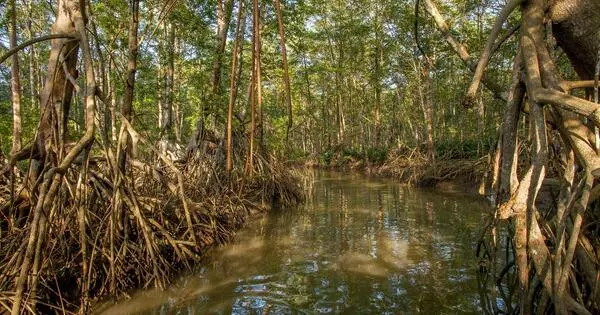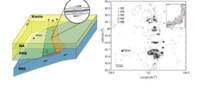Mangrove forests are critical to the health of our planet. The trees and shrubs absorb a significant amount of greenhouse gas emissions, aid in the protection of communities from rising sea levels, and serve as nurseries for baby fish.
These coastal forests are the world’s second most carbon-rich ecosystem, capable of storing more than 1,000 tons of carbon in just one hectare, roughly the size of a football field. They accomplish this by absorbing the chemical element from the air and storing it in their leaves, branches, trunks, and roots.
However, despite environmental efforts to protect these vital ecosystems, they remain vulnerable. A new study led by the University of Portsmouth and supported by the research organization Operation Wallacea has revealed how organisms process the stored carbon from atmospheric CO2 in large woody debris. The findings indicate that climate change may have a significant impact on this ‘blue carbon’ system.
University of Portsmouth researchers examined large woody debris (LWD) in four mangrove forests in Indonesia’s Wakatobi National Park with varying intertidal zones. Each survey area had up to eight sections (transects), each revealing its own method of carbon processing.
This data highlights the delicate balance between wood-biodegrading organisms and fallen mangrove wood. Mangrove forests are crucial to mitigating climate change, and alterations to the breakdown of fallen wood in the forests will change the above-ground carbon cycles which may have an effect on mangrove carbon stores.
Dr. Ian Hendy
In the upper reaches of the ecosystem, closer to land, the team discovered organisms typically found in tropical rainforests are breaking down fallen wood. These include fungi, beetle larvae, and termites. Further towards the ocean, the LWD is being degraded more quickly by worm-like clams with calcium carbonate shells, known as shipworms.
Most analysis in the effort to understand and address global climate change has focused on rapidly rising carbon dioxide (CO2) emissions and options for reducing them. Carbon dioxide, a byproduct of fossil fuel combustion, is the primary greenhouse gas responsible for global warming. Other greenhouse gases, such as methane, nitrous oxide, and a variety of industrial-process gases, are also significant contributors to climate change. Effective climate strategies should address both carbon dioxide and these other greenhouse gases, both environmentally and economically.

Greenhouse gases trap heat and warm the Earth. Almost all of the increase in greenhouse gases in the atmosphere over the last 150 years has been attributed to human activity. 1 In the United States, the largest source of greenhouse gas emissions from human activities is the use of fossil fuels for electricity, heat, and transportation.
Climate change has two potential consequences for the delicate process of fixed-carbon degradation in the mangrove forest. The first is rising sea levels, as tidal elevation drives the carbon cycle. The second is an increase in ocean acidity caused by rising CO2 levels in the atmosphere, which can dissolve the shells of marine organisms, causing wood degradation in the lower reaches.
Lead author of the study, Dr. Ian Hendy from the University of Portsmouth’s School of Biological Sciences, said: “This data highlights the delicate balance between wood-biodegrading organisms and fallen mangrove wood. Mangrove forests are crucial to mitigating climate change, and alterations to the breakdown of fallen wood in the forests will change the above-ground carbon cycles which may have an effect on mangrove carbon stores.”
Dr. Hendy and his colleagues are now planning to participate in large-scale mangrove forest restoration in Mexico. The joint biodiversity initiative rePLANET is working exclusively with a group of scientists from Portsmouth, Brighton, Singapore, and CINESTAV to fund a series of Ph.D. projects examining innovative approaches to forest preservation and protection.
“The team’s goal now is to use the findings from this study to guide large-scale restoration of mangrove forests around the world,” said the study’s co-author, Dr. Simon Cragg of the University of Portsmouth.
















